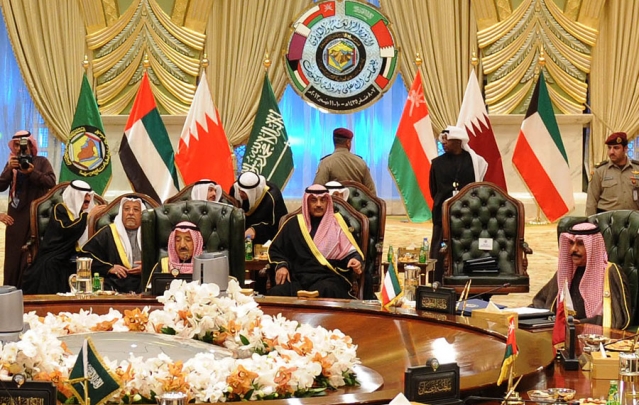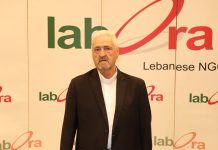The Eastern Question, 2014 Style
Eyad Abu Shakra /Asharq Al Awsat
Thursday, 20 Nov, 2014
The recent resolution of internal differences within the Gulf Cooperation Council (GCC) was a significant development, as these have allowed the enemies of the Arab Mashreq (East) to score an undeniable victory in Yemen.
Equally significant is the beginning of the hearing of political testimonies at the Special Tribunal for Lebanon, which was set up by the UN Security Council to try the assassins of Lebanon’s former prime minister Rafik Hariri and others, as well as looking into the alleged role of the Syrian regime in that crime. The tribunal has spent the previous months dealing with technical and forensic issues.
Last, but not least, are the details that have emerged about the proposals from the UN’s special envoy to Syria, Staffan de Mistura, to “freeze” the situation on the battle fronts, create “autonomous areas,” and postpone any discussion of the future of President Bashar Al-Assad and the staging of multi-party elections. This runs contrary to the spirit of the Geneva I conference, which called for Assad’s departure and the creation of a transitional administration as the main preconditions for any negotiated settlement.
In fact, these three developments are inseparable, and have arrived against a backdrop of escalating terrorist violence from jihadists operating under the veil of “political Islam,” and the collapse of hopes for a for Israeli–Palestinian peace settlement. The relationship between the rising popularity of “political Islam”—in all its shades and facets—and the insistence of the Israeli Right on destroying the credibility of Palestinian, Arab, and Muslim moderates is a direct one. In doing so it relies on Washington’s inaction in the face of Israel’s policy of accelerating its land-grabs and settlement-building, as well as its incitement and exploitation of religious fundamentalism with the intention of turning what has been a struggle against occupation into a religious war, one that defies logic, awareness, and any attempt at reconciliation.
Incidentally, the rehearsal for such a “religious war,” launched to serve political ends, is nothing new, and is not limited to Israel. What we witness today throughout the Arab Mashreq is salient proof. Iran is busy stoking Sunni–Shi’ite tensions with its sectarian militias, from Iraq to Lebanon and Gaza, via Syria—not forgetting Yemen and the continuous attempts to foment conflict among the GCC countries. The Israeli Right see a benefit in a religious war that eliminates moderate Palestinians who are qualified to conduct genuine and serious peace negotiations, leaving the Palestinian arena to religious forces who understand nothing but violence and exclusion, while failing to provide the average citizen anything on a land which is threatened with being either seized or destroyed. On the other hand, Iran’s leaders are using Islam as a camouflage to hide their true nationalist project, as it would be difficult for them to invade the region under the banners of Persian nationalism. Between the two sides there is an intersection of interests which incentivizes them to promote an “alliance of minorities” with Russo–American blessing. Indeed, de Mistura’s leaked plan is nothing but the implementation of this on the ground in Syria.
At the moment we are revisiting what was known as “the Eastern Question” during the final days of the Ottoman Empire, in addition to the familiar problems of “Sunni–Shi’ite Fitna,” the Sykes–Picot Agreement, and of course, the Balfour Declaration.
Yes, “the Eastern Question” applies to Arab lands inhabited by Christians since ancient times, and saw them take root, flourish and establish a glorious theological, cultural, scientific, and social heritage that has enriched world civilization. If ISIS’s threat to Iraqi Kurdistan and the Baghdad regime established by the occupation of Iraq in 2003 was the spark that alerted the West to react, the Christians’ fears were also instrumental in building up the mood for action.
Here I do not only mean ISIS’s onslaught against Christian (also Yazidi and Shabak) towns and villages in Nineveh Province in northwestern Iraq, but also the positions taken by Christian religious leaders in Iraq, Syria and Lebanon. They viewed Sunni jihadist extremists like ISIS as a far more dangerous immediate threat even than the growing influence of Iran’s Ayatollahs and its Islamic Revolutionary Guard Corps in the region. Without denying the fact that Assad’s regime is exploiting the extremists’ excesses, and without rejecting the possibility that its embedded shabiha (Assad’s militias, or thugs) may be taking part in them, there have been some serious incidents. Two prominent bishops, one of them a brother of the Patriarch of the Antiochian Orthodox Church, were kidnapped near Aleppo in April 2013, causing great shock and revulsion within the Christian Syrian community. In Lebanon, the Maronite Patriarch, who has been more critical of Sunni extremists than Shi’ite extremism even before his elevation to the Patriarchate, made his position clear during his early foreign visits to France and Russia, where he expressed his preference for Assad staying rather than being replaced by extremist Muslims. As for the two Antiochian Orthodox and Catholic patriarchs—both Syrian—they have always maintained good relations with the Damascus regime, and have been worried about the apparent hijacking of the Syrian revolution by radical Islamist groups following the reluctance of the international community, led by the USA, to effectively support the moderate groups, which included Christian figures such as Michel Kilo, George Sabra, and others.
Finally, it is worth mentioning the conference held by the In Defense of Christians organization in Washington, DC in September, which aimed to “empower the Middle Eastern Christian Diaspora and energize the American people to stand in solidarity for the protection and preservation of Christians in the Middle East.” Among those who financed and organized the event were several wealthy pro-Assad and even pro-Hezbollah Christian businessmen from Syria and Lebanon. Although what came out of the conference attempted to avoid provocations, its overall theme and atmosphere encouraged a Republican US senator to say that Middle Eastern Christians “have no greater ally than [Israel]”—perhaps as a guarantor for the region’s religious minorities. His naive speech was booed by some of the audience and criticized by senior clergy in attendance.
Be that as it may, the “autonomous” areas as envisaged in de Mistura’s leaked plan would almost likely be drawn with religious, sectarian and ethnic considerations in mind. Any wise observer now accepts that a future Syria cannot be the same as the pre-March 2011 Syria, as a result of the massacres and uprooting of thousands of people that has taken place and the resulting deep animosities. Thus, even if Syria survives intact, it can only do so as a loose federal state.
This begs two questions: Was it not more worthwhile to have imposed “safe havens” and “no-fly zones” before in order to minimize the number of casualties and force Assad to the negotiating table? How come the idea of “autonomous areas” now makes sense while “no-fly zones” are still being rejected?
The answer: It is “the “Eastern Question”!
المسألة الشرقية».. موديل 2014
اياد ابو شقرا/الشرق الأوسط
19 تشرين الثاني/14
خطوة مهمة جدا طي صفحة الخلاف الخليجي – الخليجي الذي شتت خلال الفترة الماضية جهود مجلس التعاون لدول الخليج العربية، وبعث برسائل مشجعة لأعداء المنطقة مفادها أنها غدت لقمة سائغة لكل من هب ودب، ما أتاح لهؤلاء تسجيل نصر لا مجال للتقليل من خطورته في اليمن. وأيضا خطوة مهمة بدء مناقشة الأبعاد السياسية لجريمة اغتيال رفيق الحريري رئيس وزراء لبنان الأسبق في المحكمة الدولية الخاصة بلبنان، ولا سيما دور النظام السوري فيها، بعدما تركزت أعمال الشهور السابقة على النواحي التقنية والأدلة الجنائية. وطبعا، على جانب عظيم من الأهمية ما رشح عن مقترحات الوسيط الدولي ستافان دي ميستورا حول سوريا، لجهة «تجميد» الوضع الميداني وإنشاء مناطق «حكم ذاتي» وترك موضوع بقاء بشار الأسد إلى مرحلة تلي انتخابات تعددية لا قبلها، وهو ما يشكل انقلابا على روح «مفاوضات جنيف» الداعية لسلطة انتقالية تحل محل حكم الأسد.
حقا، يستحيل فصل التطورات الثلاثة أحدها عن الآخر، أمام خلفيتي تصاعد العنف الإرهابي تحت قناع «الإسلام السياسي» بشقه الجهادي، وانهيار فرص السلام الفلسطيني – الإسرائيلي. ذلك أن ثمة علاقة مباشرة بين تنامي شعبية «الإسلام السياسي»، بمختلف وجوهه ودرجاته، وإصرار اليمين الإسرائيلي على تدمير فرص الاعتدال الفلسطيني والعربي والإسلامي. وهو يفعل ذلك مستقويا بالصمت الأميركي على تسريع هذا اليمين وتيرة الاستيطان واستثارته الأصولية الدينية.. لتحويل الصراع في الأراضي الفلسطينية المحتلة من نضال مشروع ضد الاحتلال إلى «حرب دينية» إلغائية لا مكان فيها للمنطق والوعي وخطوط الرجعة.
بالمناسبة, «بروفة» ما نراه من «حرب دينية» إقليمية تشن لغايات سياسية ليست جديدة تماما، ولا تقتصر على إسرائيل. وما يحصل في مناطق عدة من المشرق العربي دليل ساطع على ذلك. فها نحن أمام فتنة سنية – شيعية تنفخ إيران في جمرها عبر تنظيمات طائفية على امتداد المنطقة من العراق إلى لبنان وغزة، مرورا بسوريا، من دون أن ننسى اليمن.. والمحاولات الدؤوبة لنقلها إلى الخليج.
مصلحة اليمين الإسرائيلي من «الحرب الدينية» تقوم على تصفية أي دور للفلسطينيين المؤهلين لخوض مفاوضات سلام حقيقية، وترك الساحة لقوى دينية لا تجيد سوى لغة العنف والإلغاء ولا تقدم شيئا للمواطن على أرض إما محروقة أو مرشحة للمصادرة. أما مصلحة قادة إيران فتتمثل بإلباس مشروعهم «القومي» غلالة دينية ترفع شعارات الإسلام لأنهم عاجزون عن غزو المنطقة بشعارات «الفرسنة». وفي النهاية، ثمة «تقاطع مصالح» يتجلى بالتوافق الضمني على رعاية مشروع «تحالف الأقليات» بمباركة أميركية – روسية، وما «أفكار» الوسيط الدولي دي ميستورا سوى ترجمة لهذا المشروع.
نحن الآن في أجواء تعامل جديد مع ما كان يعرف بـ«المسألة الشرقية» إبان عهد الدولة العثمانية، بالإضافة إلى المناخات المألوفة لـ«الفتنة السنية – الشيعية» و«سايكس – بيكو» و«وعد بلفور».
نعم، «المسألة الشرقية» موجودة في الدول العربية التي سكنها المسيحيون منذ عهود سحيقة وتجذروا فيها وأسسوا إرثا عقائديا وثقافيا وعلميا واجتماعيا أثر في إغناء الحضارة العالمية. وإذا كان تهديد «داعش» حدود إقليم كردستان العراق وسلطات بغداد التي أسسها غزو العراق عام 2003، الشرارة التي حركت رد الفعل الغربي، فإن مخاوف المسيحيين كانت أيضا عنصرا مهما أسهم في بلورة الموقف الغربي. وأنا هنا لا أقصد فقط مهاجمة «داعش» القرى المسيحية (والإيزيدية والشبكية) في محافظة نينوى العراقية فحسب، بل كذلك مواقف القيادات الدينية المسيحية لكنائس العراق وسوريا ولبنان التي رأت وما زالت ترى في التطرف «الجهادي» السني الذي يمثله «داعش» تهديدا داهما أخطر بكثير من تمدد نفوذ آيات الله والحرس الثوري الإيراني في المنطقة.
ومن دون نفي تعمد نظام الأسد استغلال التجاوزات، بل من دون استبعاد ضلوع «شبيحته» فيها، جاء خطف أسقفين مسيحيين بارزين في محافظة حلب، أحدهما شقيق بطريرك الروم الأرثوذكس، في أبريل (نيسان) 2013 مفصلا فظيعا استفز المسيحيين السوريين. أما في لبنان فإن النهج السياسي للبطريرك الماروني، الأكثر تشددا إزاء التطرف السني منه إزاء التطرف الشيعي، فيعرفه اللبنانيون جيدا حتى قبل توليه سدة البطريركية. وبالفعل، كانت معظم تصريحاته، وأبرزها تلك التي أطلقها خلال زيارتيه المبكرتين لفرنسا وروسيا، ترى أن بقاء الأسد يظل أقل ضررا على المسيحيين من تولي خصومه السلطة. ولعله كان يعبر عن هذا الرأي خلال لقاءاته الدولية. وأما البطريركان الأرثوذكسي والكاثوليكي – وهما سوريان – فكانا ولا يزالان على علاقة جيدة بالنظام، وهما قلقان من مصادرة قوى دينية متشددة الثورة السورية بعدما أحجم المجتمع الدولي، وعلى رأسه الولايات المتحدة، عن دعم قوى الاعتدال في الثورة وضمنها شخصيات مسيحية بارزة مثل ميشال كيلو وجورج صبرا وغيرهما.
وأخيرا وليس آخرا، يجب تذكر «مؤتمر الدفاع عن مسيحيي الشرق» الذي عقد خلال سبتمبر (أيلول) الماضي في الولايات المتحدة، وأسهم في تمويله أثرياء لبنانيون وسوريون على علاقات وثيقة برأس النظام السوري و«حزب الله». ومع أن المقررات العلنية للمؤتمر حرصت على تحاشي الاستفزاز فإن أجواءه شجعت سيناتورا أميركيا يمينيا على الدعوة لتحالف المسيحيين المشرقيين مع إسرائيل، ربما كـ«ضامن» لأقليات المنطقة، ما أحرج عددا من البطاركة والأساقفة… فهاجموا دعوته.
في مطلق الأحوال، دي ميستورا يدعو وفق التسريبات عن مقترحاته إلى «مناطق حكم ذاتي». والمنطق يقول إن الهوية الدينية أو المذهبية أو العرقية ستساهم في رسم حدود هذه المناطق. أيضا يستبعد العقلاء تصور أن تكون سوريا المستقبل كما كانت قبل مارس (آذار) 2011، بعد المجازر والتهجير والأحقاد، وبالتالي، حتى إذا ارتؤي بقاء الكيان السوري فلا بد أن يكون كيانا فدراليا فضفاضا.
ولكن، ألم يكن أجدى فرض {مناطق عازلة} و{مناطق حظر طيران} لتقليل حجم الخسائر وإقناع النظام باكرا بفوائد التفاوض على حل سياسي؟ لماذا «مناطق الحكم الذاتي» مقبولة اليوم.. بينما {مناطق حظر الطيران} مرفوضة حتى اليوم؟
الإجابة: فتش عن «المسألة الشرقية»!



















